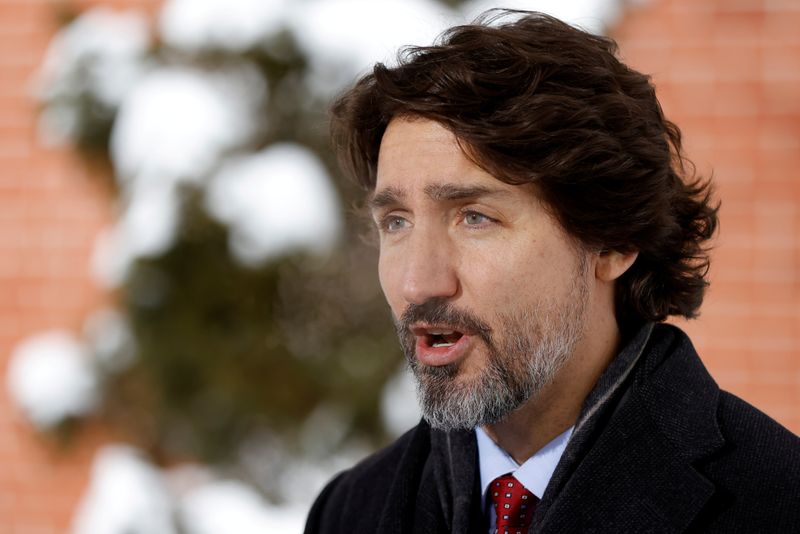By Steve Scherer and Allison Martell
OTTAWA (Reuters) - Canada will succeed in inoculating its population despite "momentary disruptions" in the supply of COVID-19 vaccines and is working closely with the new U.S. administration to fight the disease, Prime Minister Justin Trudeau said on Thursday.
Trudeau's Liberal government is under pressure over the slow roll out of the vaccination program, caused in part by Pfizer Inc (NYSE:PFE) temporarily cutting its promised deliveries and a temporary slowdown of Moderna Inc doses.
"Obviously with this global supply chain around new products and manufacturing scale-ups ... there are momentary disruptions week over week. But we're still very much on track to get the commitments fulfilled and get many vaccines to Canadians as quickly as possible," Trudeau said in an interview.
Trudeau promised that tens of millions of doses would arrive in the months to come and reiterated that every Canadian seeking inoculation would be vaccinated by September.
As part of a bid to contain the spread of the disease, Canada and the United States have closed their joint border to non-essential travel. Trudeau said he and new U.S. President Joe Biden agreed on a joint approach to fighting COVID-19.
"We're working very, very closely on all aspects of it from borders to scientific research to indeed vaccines," he said.
"Our conversations are going to continue with the U.S. on supply chains," he said, without giving details. Last year, tensions arose between Canada and the administration of then President Donald Trump over delays in the supply of personal protective equipment.
Last year Trump also signed an executive order aimed at keeping U.S.-produced vaccines in the United States. Trudeau did not give a direct answer when asked whether he would press Biden to scrap the order.
Canada does not yet have a vaccine manufacturing facility of its own and is reliant on foreign suppliers.
Separately, federal Procurement Minister Anita Anand said deliveries of AstraZeneca (NASDAQ:AZN) Plc's COVID-19 vaccine could begin before the end of March, if Canada's health regulator approves its use.
AstraZeneca Canada filed a rolling application for its vaccine with Health Canada in October and is waiting for approval from the drug regulator. Health Canada is expected to complete its review soon.
In a separate briefing, federal officials confirmed Canada's most recent shipment of Moderna Inc's COVID-19 vaccine contained 22% fewer doses than originally expected and said the next shipment, due in three weeks, would also be short.
Fortin added Moderna was working in "good faith" to deliver those doses as quickly as possible to Canada and noted the obstacles would be temporary.
Shipments of Pfizer Inc's vaccine, meanwhile, are expected to ramp up later this month.
Trudeau's government is also facing criticism over tapping into COVAX, a global vaccine-sharing initiative meant to help low-income countries buy doses. Canada will get 1.9 million AstraZeneca doses from the initiative.

"Our government will never apologize for doing everything possible to get Canadians vaccinated as quickly as possible," Deputy Prime Minister Chrystia Freeland told lawmakers.
